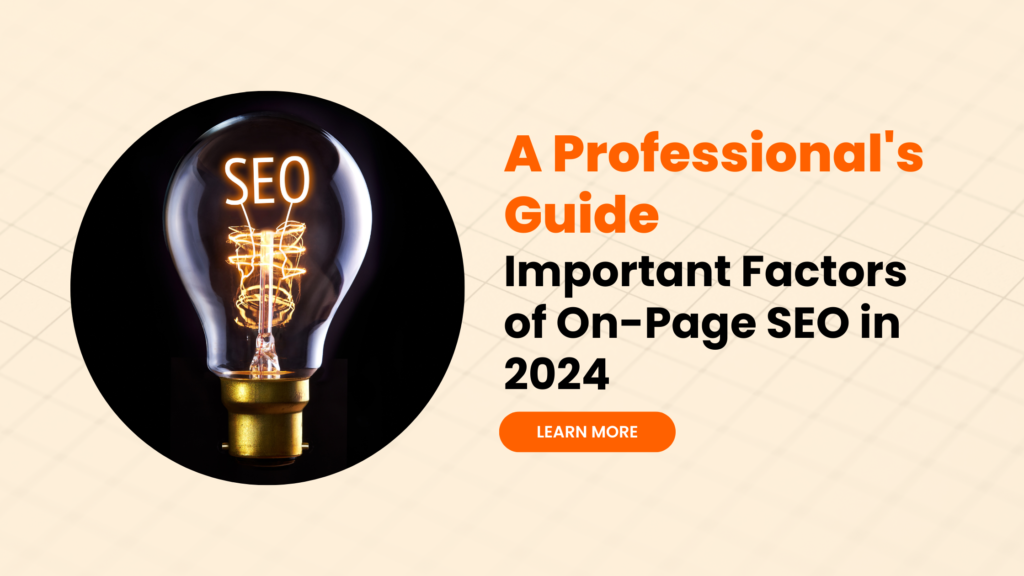Welcome to the ever-evolving landscape of digital optimization! As a seasoned SEO expert navigating the intricate world of search engine algorithms, I understand the critical role that on-page SEO plays in driving organic traffic and boosting search rankings. In this blog post, we’ll delve into the key factors that will shape the on-page SEO landscape in 2024, providing you with insights to stay ahead in the game.
1. Content Quality and Relevance
In 2024, the mantra “Content is King” remains paramount. However, it’s not just about quantity; it’s about delivering high-quality, relevant content. Search engines are becoming increasingly sophisticated in understanding user intent. Crafting content that answers user queries comprehensively while maintaining relevance to your target keywords is essential.
2. User Experience (UX) and Core Web Vitals
User experience is a pivotal factor influencing search rankings. Google’s Core Web Vitals, which include metrics like loading speed, interactivity, and visual stability, are now integral in assessing user experience. Ensure your website provides a seamless and enjoyable journey for visitors, from swift page loading times to responsive design across devices.
3. Mobile Optimization
With the majority of searches now originating from mobile devices, optimizing for mobile is non-negotiable. Responsive design, mobile-friendly content, and ensuring a consistent user experience across various screen sizes are vital for on-page SEO success.
4. Structured Data and Schema Markup
Search engines thrive on understanding the context of your content. Implementing structured data and schema markup provides search engines with additional information about your content, enabling rich snippets and improving the chances of appearing in featured snippets.
5. Keyword Optimization and Semantic SEO
While keywords remain foundational, semantic SEO is gaining prominence. Search engines now comprehend the context and intent behind user queries. Incorporate semantically related terms to signal the relevance and depth of your content. This nuanced approach enhances your chances of ranking for a broader spectrum of queries.
6. Page Speed and Performance
In 2024, users demand instant gratification. Pages that load swiftly not only provide a better user experience but are favoured by search engines. Optimize images, leverage browser caching, and invest in reliable hosting to enhance your website’s speed and overall performance.
7. Security (HTTPS)
Website security is no longer an optional feature; it’s a necessity. Google gives preference to secure sites with HTTPS, and users are more likely to trust a website that provides a secure connection. Ensure your site is protected with an SSL certificate.
Conclusion
Staying ahead in the dynamic realm of on-page SEO requires a proactive approach and a commitment to adapting to industry shifts. By prioritizing content quality, user experience, mobile optimization, structured data, semantic SEO, page speed, and security, you position your website for success in the ever-evolving landscape of search engine optimization.
As we embrace the challenges and opportunities that 2024 brings, remember that effective on-page SEO is not a one-time effort but an ongoing strategy that evolves with the digital landscape. Stay informed, implement best practices, and watch your website rise in the rankings.
FAQs
Q. How often should I update my website’s content for optimal SEO?
Ans. Regular updates are beneficial. Aim for refreshing content at least quarterly to reflect industry changes and keep it relevant.
Q. What tools do you recommend for monitoring Core Web Vitals?
Ans. Tools like Google PageSpeed Insights and Lighthouse can help assess and improve Core Web Vitals.
Q. Is mobile optimization more critical than desktop optimization for SEO?
Both are important, but given the rise in mobile searches, mobile optimization holds significant weight in SEO considerations.
Q. How can I implement structured data on my website?
Ans. Various online resources and plugins, such as Google’s Structured Data Markup Helper, can guide you in implementing structured data.
Q. Does HTTPS impact SEO rankings significantly?
Ans. Yes, Google considers HTTPS as a ranking factor, and it contributes to a secure and trustworthy online environment.
End this comprehensive guide on a positive note, encouraging readers to implement these strategies for a successful on-page SEO journey.

